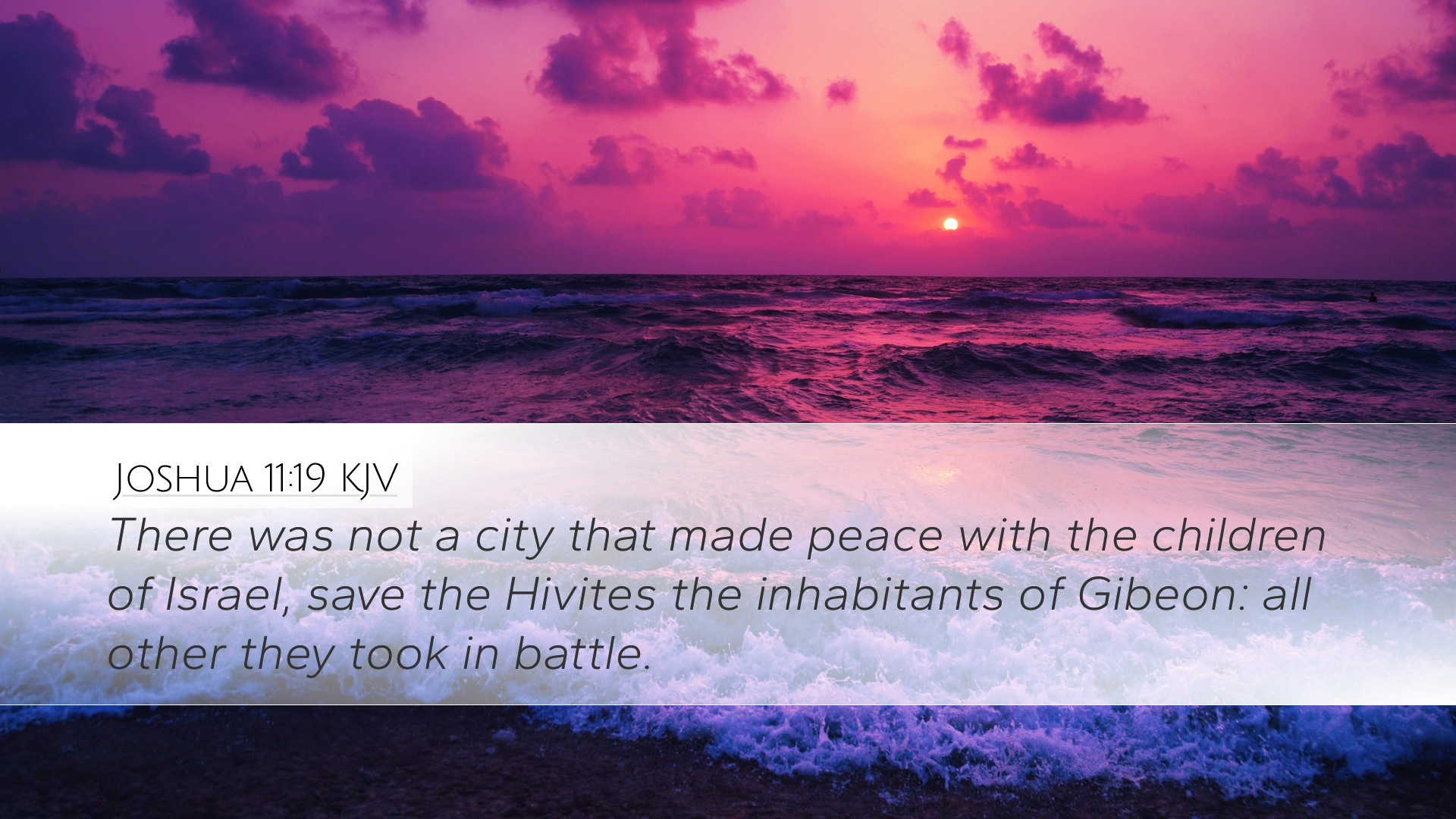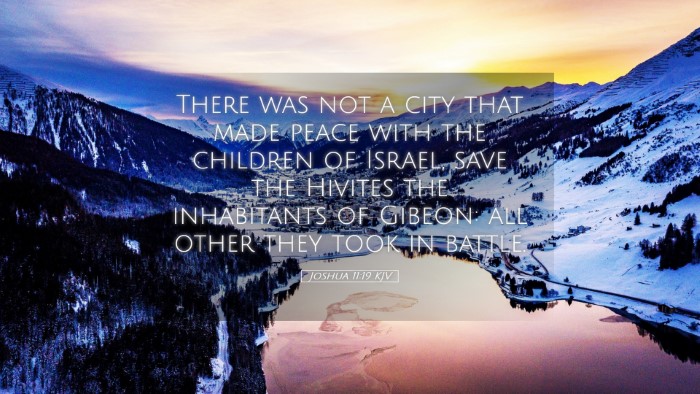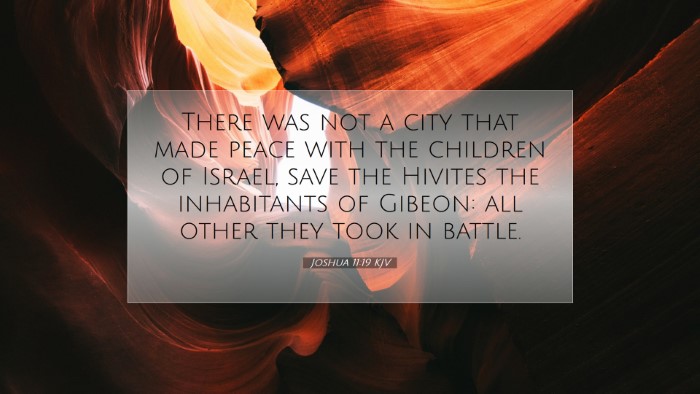Old Testament
Genesis Exodus Leviticus Numbers Deuteronomy Joshua Judges Ruth 1 Samuel 2 Samuel 1 Kings 2 Kings 1 Chronicles 2 Chronicles Ezra Nehemiah Esther Job Psalms Proverbs Ecclesiastes Song of Solomon Isaiah Jeremiah Lamentations Ezekiel Daniel Hosea Joel Amos Obadiah Jonah Micah Nahum Habakkuk Zephaniah Haggai Zechariah MalachiJoshua 11:19
Joshua 11:19 KJV
There was not a city that made peace with the children of Israel, save the Hivites the inhabitants of Gibeon: all other they took in battle.
Joshua 11:19 Bible Commentary
Commentary on Joshua 11:19
Verse Reference: Joshua 11:19 - "There was not a city that made peace with the children of Israel, save the Hivites the inhabitants of Gibeon; all other they took in battle."
Introduction
This verse marks an important moment in the conquest narrative of the Israelites as they enter the Promised Land. It highlights the general principle of resistance versus submission among the cities of Canaan in response to Israel's military campaigns. The mention of the Hivites of Gibeon stands out as a notable exception in this account of warfare.
Historical Context
The context of this verse is the culmination of several military campaigns led by Joshua. After crossing the Jordan River, the Israelites faced a series of battles to take possession of the land. This verse emphasizes the fierce opposition encountered and illustrates the complete dominance of Israel in the region at that time.
Exegesis of Key Phrases
- "Not a city that made peace:" This phrase conveys the degree of hostility exhibited by the Canaanite nations. The refusal to negotiate peace with Israel illustrates their steadfastness in defending their territory against the advancing Israelite army. From a theological standpoint, this rejection signifies a deeper spiritual battle, where nations represent forces in opposition to God's will.
- "The Hivites the inhabitants of Gibeon:" The Gibeonites, through cunning and deceit, sought to survive by willingly aligning themselves with Israel (as detailed in Joshua 9). Their approach serves as an important case study in the complexities of human alliances and divine providence. The Gibeonites' choice of peace fundamentally alters their identity and role within the unfolding biblical narrative.
- "All other they took in battle:" The phrase underscores the effectiveness of Israel's military strategy under Joshua's leadership. It suggests that other cities did not have the foresight or wisdom to seek terms of peace, leading them to destruction. The notion of divine judgment is prevalent, as God's hand evidently favored Israel in these encounters.
Theological Implications
Thematically, this verse speaks to the overarching sovereignty of God in the affairs of nations. The divine mandate for Israel to conquer Canaan reflects God's desire to fulfill His covenant promises to Abraham, Isaac, and Jacob. The distinction between Gibeon and the other cities speaks to the mercy of God extended even to those who might consider themselves enemies. The choice of the Gibeonites illustrates the practical reality of repentance and seeking peace with God.
Commentary Insights
Matthew Henry Insights
Matthew Henry highlights that the Gibeonites' survival is a stark contrast to the others' destruction. He emphasizes that their survival was a result of their choice to submit to Israel as servants rather than face inevitable defeat. This account illustrates God's mercy and the importance of humility in seeking refuge in the Lord’s people.
Albert Barnes Thoughts
Albert Barnes elaborates on the uniqueness of this verse, noting that the outright warfare against other cities was part of God's judgment on those nations because of their sins. Barnes points out that Gibeon's decision to ally with Israel can be seen as both an act of shrewdness and a foretaste of the inclusivity of God’s covenant - that even those outside the Israelite nation could find a place among God’s chosen.
Adam Clarke Commentary
Adam Clarke discusses the socio-political ramifications of this war. He references the significant loss incurred by those who did not seek peace. Clarke suggests this reflects a moral lesson: that peace, while often difficult to attain, can be more beneficial than the path of resistance, especially when that resistance is against divine will.
Practical Applications
For pastors, students, theologians, and Bible scholars, Joshua 11:19 serves several practical applications:
- Faith and Surrender: The Hivites' choice presents a model for how believers today can approach God in humility and surrender, seeking His mercy rather than resisting His will.
- Understanding God’s Justice: The complete subjugation of rebel cities illustrates God's justice and righteousness in dealing with sin and disobedience. It invites reflection on the consequences of turning away from God.
- Lessons on Conflict Resolution: This text encourages contemplation on how to navigate conflict - the importance of seeking peace and the willingness to submit for greater wisdom and a better outcome.
- Covenant Relationship: This narrative emphasizes the importance of engaging in a relationship with God and understanding His plans. The Gibeonites’ choice reminds us that no one is beyond redemption.
Conclusion
Joshua 11:19 is a rich verse that invites deep reflection on themes of warfare, divine judgment, and mercy. The stark contrast between Israel's conquest and the Gibeonites’ strategic submission offers multiple layers of meaning regarding God’s work among nations and individuals. Through studying this scripture, one is reminded of God’s sovereignty, the importance of aligning with Him, and the opportunities for redemption that exist even amid conflict.


